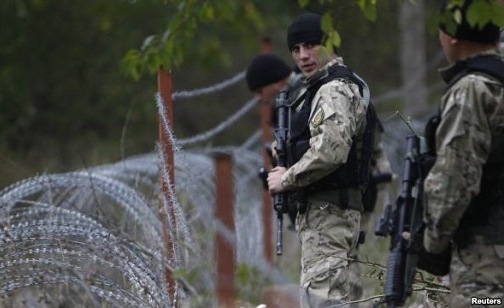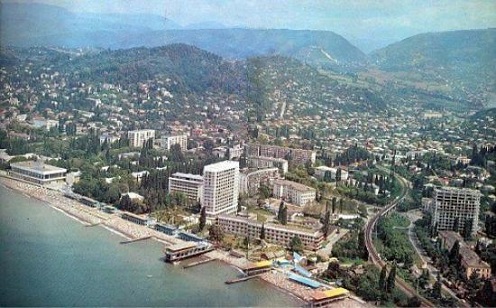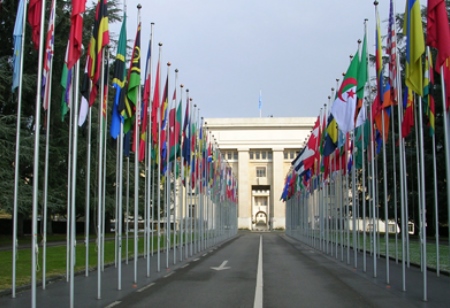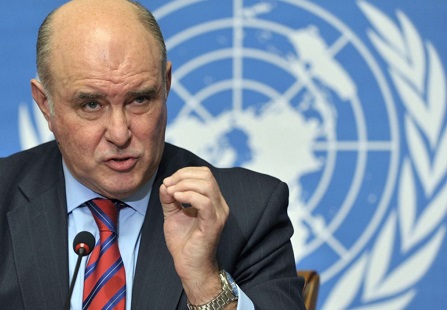Georgia denies discussing Russian document on non-use of force at Geneva Talks

Georgia’s Foreign Ministry (MFA) is denying information released by the Russian Foreign Ministry that participants of the 29th round of Geneva Talks allegedly discussed a draft of the joint statement presented by Russia regarding non-use of force and security guarantees.
Given the high level of public interest in issues regarding the agenda of the international discussions, Georgian Foreign Ministry responded to Russia’s Wednesday’s statement. It said it disagreed with comments made by the Russian side, and participants of the Geneva Talks did not discuss any such document initiated by Russia, to which attested a communiqué issued by the co-chairs of the International Geneva Discussions.
The communiqué issued on October 8 stated participants exchanged views on non-use of force, international security arrangements as well as best practices and cooperation.
"They have agreed to continue working on a draft joint statement by participants on non-use of force at the next Geneva round,” the communiqué read.
Georgia’s Deputy Foreign Minister Davit Zalkaliani, who led the Geneva Discussions from the Georgian side, reaffirmed that the ‘Russian project’ regarding non-use of force had not been discussed at the meeting.
"Georgia has twice committed to the obligation of non-use of force and has fulfilled it. It is Russia which has the inevitable obligation to comply the non-use of force agreement. The co-chairs of the International Geneva Discussions also called on Russia to fulfill the agreement,” Zalkaliani said.
During the discussions Russian Deputy Minister Grigory Karasin tried to talk about the possible deployment of NATO infrastructure in Georgia, which was believed by Russia to be a threat to stability in the Caucasus region.
But the Georgian diplomat quickly denied this and said the country’s cooperation with NATO would not pose a threat to regional security, but "unsolved conflicts” did impact on the stability of the Caucasus region.
"We wanted to separate this issue from the Geneva International Talks because in the framework of these meetings this kind of issue must not be discussed,” Zalkaliani said.
The Geneva Talks, which are co-chaired by representatives from the EU, UN and OSCE, focused mostly on international security arrangements on the ground and discussions relating to humanitarian issues.
Discussions were launched after the August 2008 war with the participation of negotiators from Georgia, Russia, and the United States, as well as from de facto authorities in the Abkhazia and South Ossetia regions of Georgia.
The Georgian Foreign Ministry said overall the meeting was conducted in a business-like atmosphere and participants discussed all agenda items of the two Working Groups.
The co-chairs of the talks said the discussions took place in a "constructive and positive atmosphere”.
"Illegal military exercises, violations of airspace controlled by the Government of Georgia, increased practice of kidnapping, robbery and cases of detentions for so-called 'illegal border crossing' have been brought to the attention of the co-chairs,” stated the press office of Georgia’s Foreign Ministers.
The Ministry said head of the EUMM, Toivo Klaar had adequately assessed the security situation and comprehensively presented the security incidents that took place in the adjacent areas of the occupation line.
"The existing security context on the ground underscores the importance of an early resumption of the Gali IPRM mechanism without preconditions, based on proposals for the Mechanism of 18 February 2009, and in full composition,” the Ministry statement said.
After the meeting the co-chairs of the discussion from the US announced future discussions should lead to progress on reversing "borderization,” removing restrictions on freedom of movement along the Administrative Boundary Lines (ABLs), and concluding a non-use of force agreement between Georgia and Russia.
"We called on the de facto authorities in the Abkhazia and South Ossetia regions of Georgia to protect the human rights of all residents,” the US Mission in Geneva said.
Georgian meeting participants expressed concerns over Russia's illegal activities along the occupation line and in their adjacent areas.
"We have expressed their serious concern over the discriminatory measures exercised against the Georgian population in both Abkhazia and Tskhinvali regions and the violation of the social, economic and cultural rights of the local residents,” the Ministry said.
The Georgian side called upon all participants to respect fundamental rights and freedoms of the local population irrespective of their ethnic origins.
On one of the principal agenda items of the Working Group II pertaining to the right of IDPs to safe and dignified return, Georgian participants welcomed the co-moderators' call to advance discussions and make further efforts in this direction.
In addition, participants discussed the issue of missing persons and emphasized the importance of continued cooperation.
The Georgian side expresses its appreciation for the dedication and efforts of the co-chairs to protect the main goals of the Geneva Discussions and their unwavering efforts to safeguard the format and agenda of the discussions.
The next round of the Geneva International Discussions – the 30th – will be held on December 9 and 10, 2014.
 Tweet
Tweet  Share
Share


